Fiber Arts Take Over a Former Seaport Warehouse in NYC
See waterfalls of fabric, intricate threadwork, massive tapestries, and more!


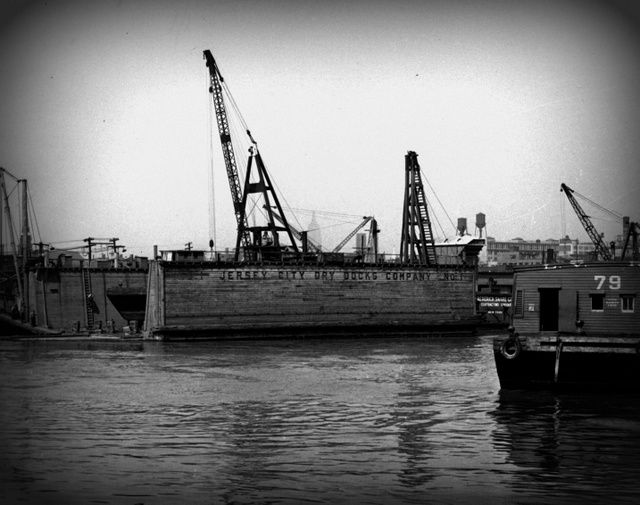 Historic photo of No. 79 barge circa 1940s from David Sharps, Waterfront Museum
Historic photo of No. 79 barge circa 1940s from David Sharps, Waterfront Museum
Untapped Cities is an official blog ambassador for Partners in Preservation , a community-based initiative by American Express and the National Trust for Historic Preservation to raise awareness of the importance of historic places. Stay up-to-date with Untapped’s coverage of all 40 sites by following our Partners in Preservation category.
A relic of New York’s industrial heritage is parked near Manhattan’s most modern neighborhood. Framed by shining Battery Park City condos and Freedom Tower cranes, the wooden Lehigh Valley Railroad Barge No. 79 and Tug Pegasus docked at Pier 25 on the Hudson River present a striking contrast to today’s city. Now operating as the Waterfront Museum, the No. 79 and Tug Pegasus are an anachronism, reflective of the Lighterage Era (1860-1960) – before metal shipping containers, when goods were transported in wooden barges from large ships to rail terminals on shore – that transformed New York City from merely the largest New World port to a 20
thcentury global metropolis.
Probably the last remaining all-wooden Hudson River railroad barge still afloat, the No. 79 was once one of over 5000 similar barges filling the New York Harbor in the 1930s and 1940s with life. Tugboats like the Pegasus escorted these barges from ships moored in the harbor to the shore as they transported coffee, sugar, rice, dates – “anything you could put in a burlap bag,” according to its owner – to the hundreds of waiting Stevedores ready to unload the cargo onto rail cars. In the case of the No. 79, bags would be loaded onto Lehigh Valley cars, one of thirteen private railroad companies operating in the harbor, and sent through northern New Jersey and eastern Pennsylvania into upstate New York.
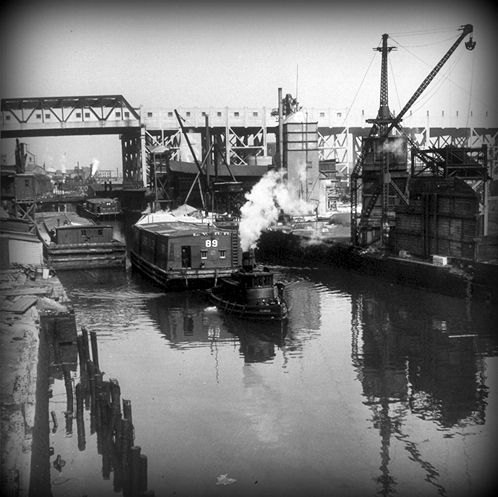 The No. 89, a barge built slightly after the No. 79, traveling up the Gowanus Canal,with the Culver Viaduct G and F Subway line in the background circa. 1940s (from David Sharps, Waterfront Museum
The No. 89, a barge built slightly after the No. 79, traveling up the Gowanus Canal,with the Culver Viaduct G and F Subway line in the background circa. 1940s (from David Sharps, Waterfront Museum
During the early 19th century, barges like the No. 79 were the lifeblood of New York’s economy, facilitating trade and providing job opportunities for the hundreds of thousands of immigrants arriving on its shores. As a result, Manhattan’s shorelines were ringed with wooden piers from the Upper West Side around to the Upper East Side, as were the shorelines of Brooklyn and New Jersey.
Today, the 98-year-old barge is the lifeblood of a different sort. Rescued and rehabilitated by David Sharps, a former circus performer who discovered a mud-caked No. 79, today the barge has been restored and operates as a museum and performance space. His spider-veined cheeks speak of a life lived on the water, from commercial cruise ships to house boats on the Seine to the No. 79, which he discovered in the mud flats near Jersey City among the ruins of hundreds of wooden barges. Normally parked in Red Hook, for another week both the No. 79 and Tug Pegasus Waterfront Museum will be parked at Pier 25 on the Hudson River, just north of Battery Park City.
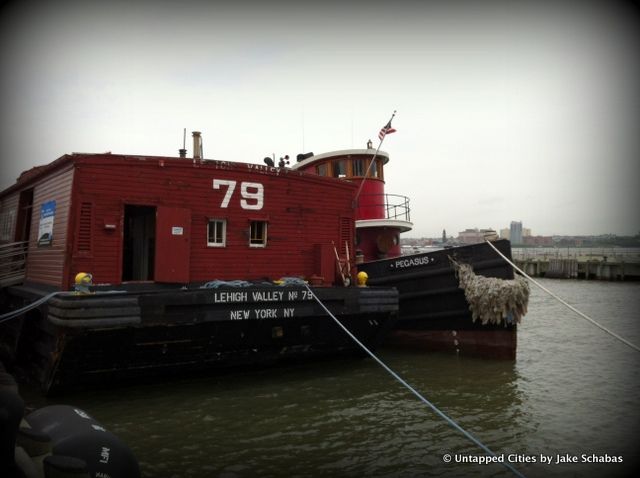 The Lehigh Valley No. 79 and Tug Pegasus docked on the Hudson River
The Lehigh Valley No. 79 and Tug Pegasus docked on the Hudson River
In terms of the revitalization of New York’s waterfront, David was way ahead of the curb. As in the early 1900s, the barge is a live-work space for David and his family who live below the main deck and in a cozy back room with piano, kitchen, Macbook and all. Meanwhile, since its opening in 1986 the museum has attracted over a million New Yorkers to the water’s edge. Much has changed since then, particularly the water quality. Once called the “Clean Harbor” by captains for the polluted harbor’s ability to clean all living things from the hull of their boats, today better water has meant the return of woodworms that eat through the barge’s side, making preservation no easy task.
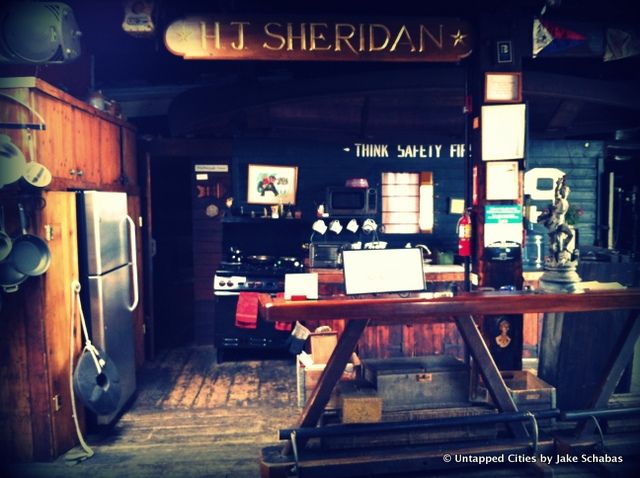 The kitchen and exhibition space inside the no. 79
The kitchen and exhibition space inside the no. 79
The Tug Pegasus has held up better, operating continuously from 1907 to 1997, moving barges and other ships through the harbor. Now retired, Captain Pamela Hepburn – probably the first woman to be a licensed New York harbor captain, she thinks – tugs only the No. 79, taking it from Red Hook to Hudson River Park as well as on occasional tours as far as Jersey City. With a 600 horsepower General Motors engine from the 1950s below deck and nautical charts above, the Pegasus still remains functional and seaworthy despite being over a century old.
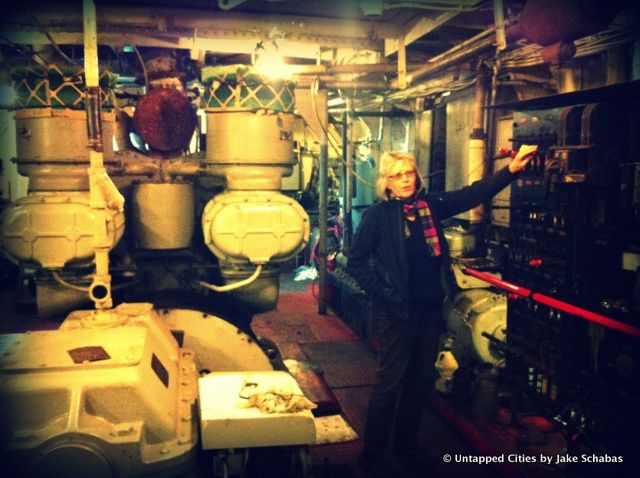 The underside of the Tug Pegasus with Captain Pamela Hepburn
The underside of the Tug Pegasus with Captain Pamela Hepburn
Showing me around, both David and Captain Pam quickly made their respective beds as they took me through each ship’s living quarters. A portico used to sit atop the No. 79 where the barge operator and family would live. These were removed when hydraulic lifts replaced Stevedores, requiring the large beams in the middle of the deck that supported the room to be removed. As a result, the No. 79’s open dimensions today provide a great performance space where David hosts book launches, concerts, art exhibits and kids workshops. The Pegasus is more utilitarian, mostly filled with motor-related equipment except for a beautiful dining table, number-tiled kitchen and four galley beds stacked against the wall below deck.
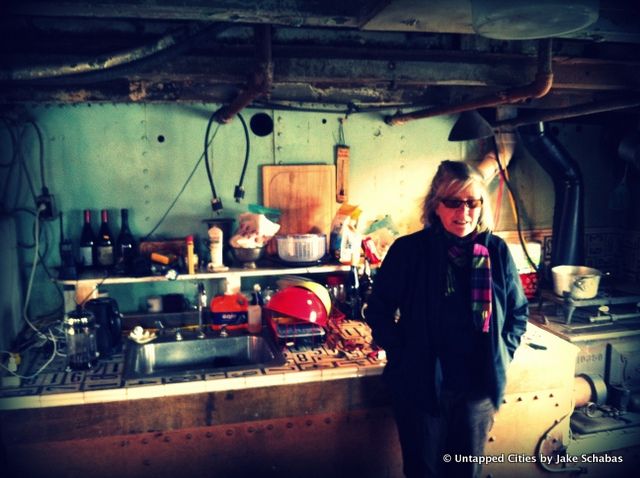 The Pegasus Kitchen
The Pegasus Kitchen
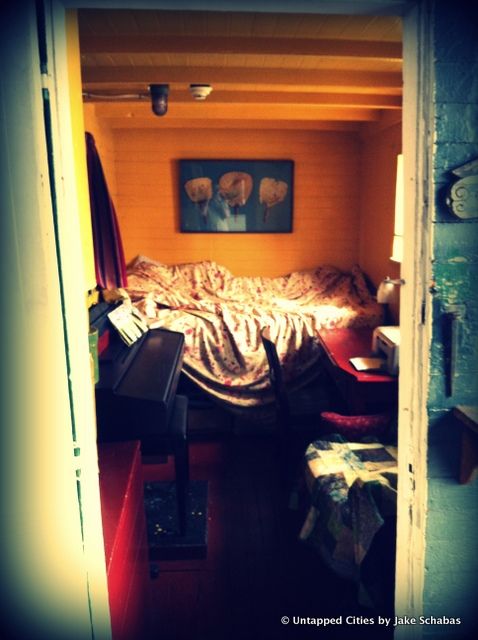 A bedroom in the No. 79
A bedroom in the No. 79
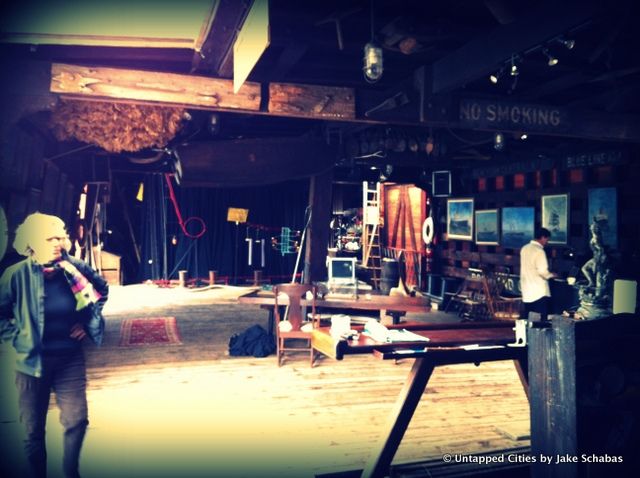 The main area inside the No. 79
The main area inside the No. 79
As New York City’s first-ever citywide grassroots preservation effort, the call-to-action program will enlist the aid of all New Yorkers, and anyone who loves New York, to vote online to allocate $3 million dollars to the preservation projects most important to them. Make the Tug Pegasus and Waterfront Museum Barge one of these projects.
Click here to vote for the Tug Pegasus and Waterfront Museum Barge, and find out more about the Museum @MuseumBarge and Facebook. Follow Untapped Cities on Twitter and Facebook. Get in touch with the author @jakeschabas.
Subscribe to our newsletter